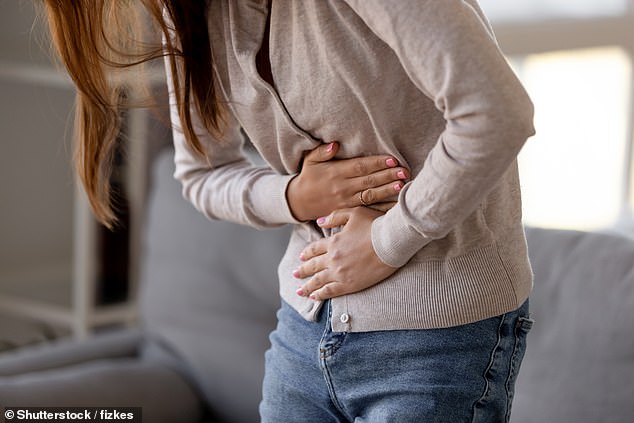Doctor reveals how to deal with one of most embarrassing effects of anxiety – and why it happens
You’re getting ready to give a big presentation at work, when suddenly nature calls.
Your nervous toilet trips could be explained by the invisible wire connecting your head to your intestines, said Dr. Nicole Cain, who lives in Arizona.
Doctors have only recently begun to explore the complex relationship between the brain and the digestive system.
“The gut and the brain communicate on a bidirectional axis and that’s called the gut-brain microbiome or the gut-brain microbial axis,” Dr. Cain to DailyMail.com.
‘And we discovered that the gut bacteria actually talk a lot more than the brain.’
The stomach sensations you may feel when you are nervous are evidence of the gut-brain axis
Her advice is to breathe deeply and slowly when you feel anxiety increasing. Avoiding foods high in fiber and caffeine can also limit the effects.
Dr. Cain began focusing on the gut-brain connection in medical school after seeing a patient with a crippling case of Crohn’s disease and anxiety.
The patient lay on the bathroom floor for days, with joint pain and chronic diarrhea, and no treatment worked.
Ultimately, targeted treatment helped her manage her gastrointestinal symptoms, and at the same time her anxiety seemed to miraculously disappear.
This, Dr. Cain said, got her thinking: “There is something profound in this.”
Before a first date, a big test, or a public speech, our brains can send out stress and anxiety signals.
These tell the body to release chemicals such as cortisol, serotonin and adrenaline.
These messengers travel throughout the body, sending your heart rate and blood pressure into overdrive and attaching to receptors in the intestines.
This causes a ‘tightening or churning’ feeling, which stimulates your bowels and causes waves of contractions that tell you to head for the porcelain throne.
You may not need to go anymore when the fear stops.
Other times, your body actually works up something during this storm and doesn’t let it go until you can relax and your body is able to release the stool.
“Immediately after the adrenaline rush, everything can hit you at once,” gastroenterologist Dr. Christine Lee told the Cleveland Clinic.
On the other hand, depression can also affect the intestines.
For some people dealing with depression, the condition is caused by an imbalance in chemicals called neurotransmitters.
Serotonin is a neurotransmitter that helps control sleep, sex drive, mood and digestion. Between 90 and 95 percent of it is produced in the digestive system, according to the University of Pennsylvania.

Dr. Cain became attuned to the gut-brain axis after a patient with a severe case of Crohn’s disease and anxiety were both healed at the same time
This has led researchers to theorize that in some depression patients the problem could stem from intestinal dysfunction, as their digestive systems may not produce enough serotonin to keep the brain functioning smoothly.
In addition, serotonin itself makes changes in the intestines.
‘There are more serotonin receptors in the intestinal tract than in the brain. This means that serotonin plays just as much of a role in the intestinal tract as it does in the brain,” says Dr. Lee.
In the gastrointestinal tract, serotonin helps control how quickly food moves through your intestines, how much fluid is produced to break down and move food, and how sensitive you are to sensations such as fullness and intestinal pain.
Research has found similar, strange links between gastrointestinal health and depression.
Implanting stool samples from people with depression into rats without bacteria led to them developing symptoms of depression, such as disinterest in their normal activities, a University College Cork research from 2016 found.
A major study from 2023 Examination of stool samples from more than 1,000 people found that people with depression all had low levels of the bacteria Eubacterium ventriosum, compared to people without depression.
This suggested that the lack of this bacteria could contribute to the condition.
A final way the gut-brain connection shows up is through the vagus nerve, Dr. Cain said.

The hormones and neurotransmitters released during a stress response have many receptors in the gastrointestinal tract
The vagus nerve is one of a series of twelve major nerves that extend directly from the brain to the body. It controls a whole host of functions beyond your will, including digestion, heart rate, and the immune system.
One of the most important tasks is to move your body from stress to decompression. After you leave a stressful situation, your vagus nerve activates, keeping your heart rate steady, reducing anxiety and boosting your immune system.
This also calms your intestines, working on processing food and providing energy at a leisurely pace.
Some naturopaths, like Dr. Cain, say this system can be “hacked” to your advantage. If you find yourself getting anxious or stressed in a situation where you don’t need to, you can try activating your vagus nerve, which will give your body and your gut a hard reset.
Deep breathing exercises, mindfulness, cold exposure and meditation can turn your vagus nerve “back on” — helping you feel calmer, Dr. Cain said.
Whether it’s from anxiety, depression or a simple vagus nerve simulation, each of us has to deal with the strange interaction between the gut and the brain, said Dr. Cain, “Rather than feeling shame about it, it’s understand that this is your body, you have information.
“We are generally the product of our intestines.”
